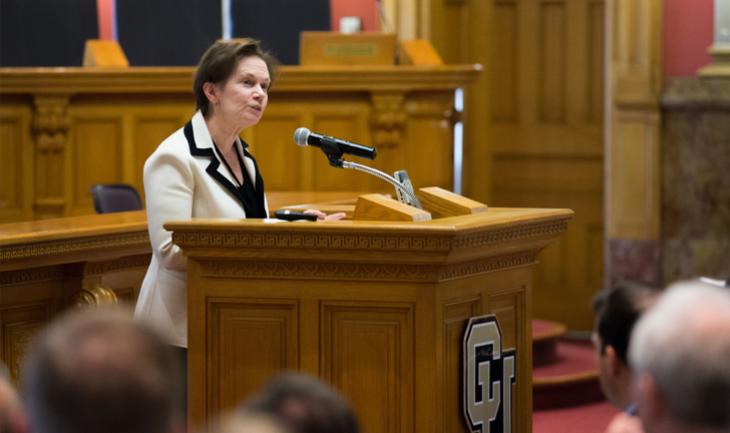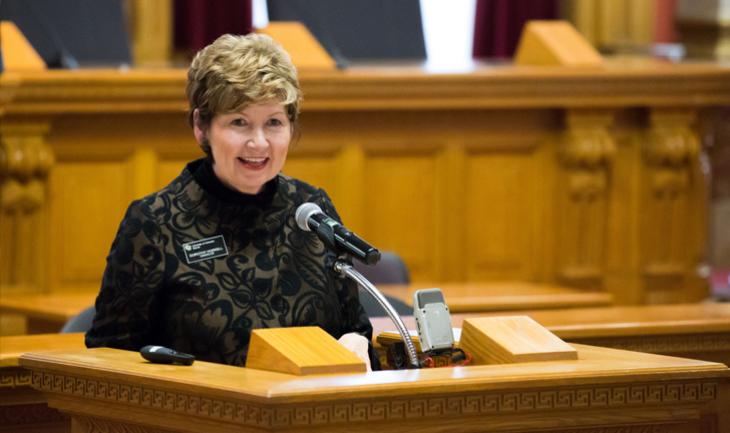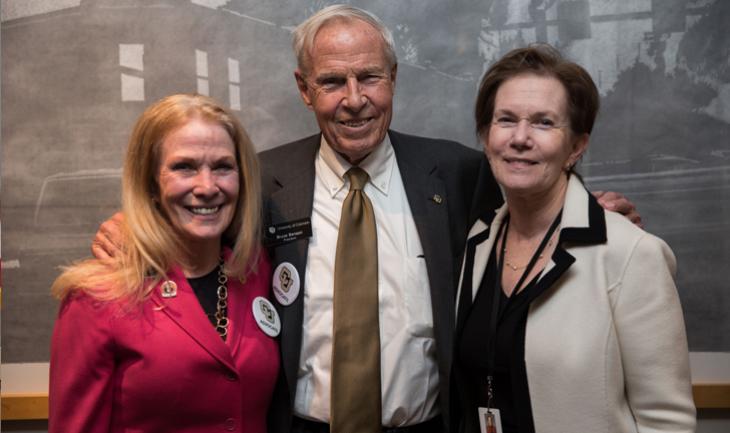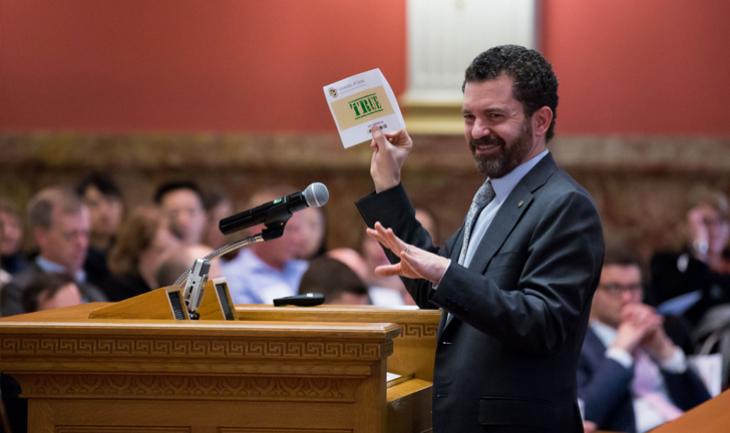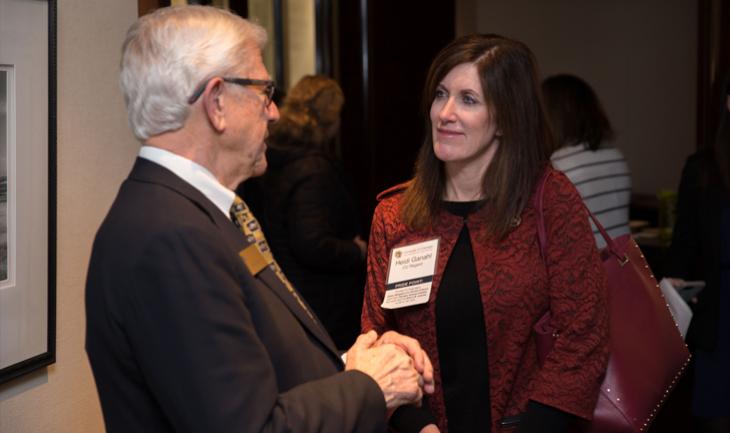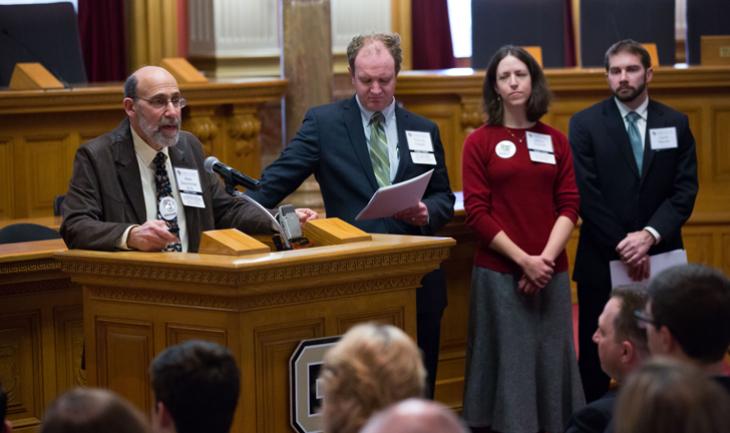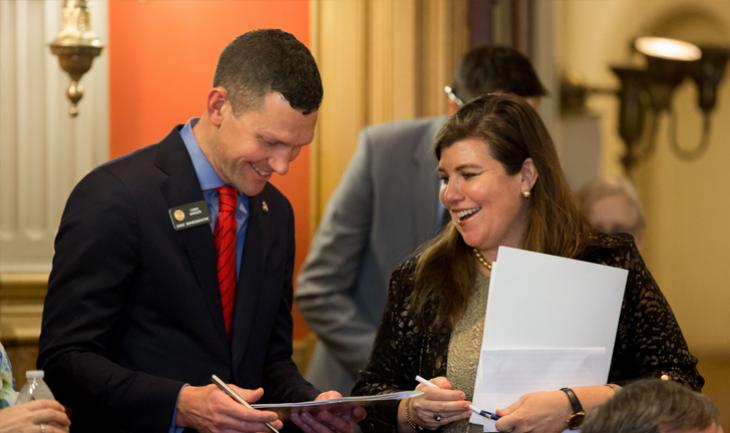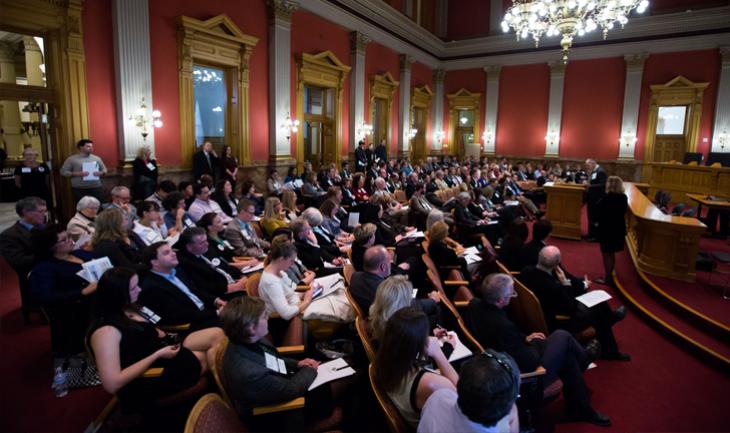CU community celebrates successes, eyes challenges at Capitol
Faculty, staff and students from across the University of Colorado came together with state leadership and members of the CU Advocates – the grassroots network of supporters from the CU community and beyond – for Tuesday’s annual CU Advocacy Day at the Capitol.
With more than 130 people filling the Old Supreme Court Chambers, the event marked record attendance, with most continuing the networking at a legislative reception later at nearby Benson Mineral Group, where President Bruce and Marcy Benson hosted.
Both events were attended by numerous state senators and representatives and current and past members of the Board of Regents.
During the nearly two-hour program at the Capitol, attendees heard from President Benson and other CU leaders, including Tanya Kelly-Bowry, vice president of government relations, and Todd Saliman, vice president of budget and finance.
Making her first appearance at the event was Lt. Gov. Donna Lynne, who took the office last May. Formerly a top executive for Kaiser Foundation Health Plan Inc. and Kaiser Foundation Hospitals, she also serves as Chief Operating Officer for the state.
“The most important thing you need to know about me is I am a proud parent of a CU graduate,” Lynne said with a smile. “He was smart enough to be a chemical engineer and he received a job offer within three days of graduation.”
Her first few months on the job also entailed serving as acting executive director of the Department of Higher Education.
“We know that by 2020, three-quarters of the jobs in Colorado will require some education beyond high school. We’re not there yet – we’re in the 50s,” she said. “As a business person, what I cared most about was, can I find a talented pool of employees? … You can’t be successful in Colorado if you don’t have jobs. And if you don’t have the workforce to meet those needs, you’re not going to be successful.”
Lynne noted that Gov. Hickenlooper’s budget request includes a $20.5 million increase for higher education. Of that increase, of which $3.8 million is for financial aid, CU’s four campuses would receive an estimated $7.8 million, an increase of 4 percent over last year’s state funding.
“We made sure that universities got a funding increase this year (in the request),” Lynne said. “We know that you could use more – we recognize that.” She acknowledged that leaders continue to work on budget challenges, and that the request could undergo changes before approval in March, but said she is hopeful.
During a segment that challenged audience members to separate common higher education myths from truths, Saliman illustrated ways in which the university and student families are challenged by the overall trend of the past 16 years that has seen state funding drop dramatically. He said party politics aren’t to blame, though.
“We have great friends on both sides of the aisle who are supportive of higher education,” Saliman said. “They just have very few options, because the state budget is so tight.”
That reality has led CU to seek greater efficiencies and flexibility at the Legislature for many years.
As for this year’s session, which got underway in January and continues into May, Kelly-Bowry told the audience about two early bills that she and the Government Relations team are working on with lawmakers. One of the CU-initiated bills addresses higher education employment contract terms. Term employment contacts currently are limited to six per campus and system; contract lengths also are limited. Sponsored by Sen. Kevin Priola, R-Brighton, this bill would enable more flexibility by exempting contracts for positions funded by revenue from auxiliary activities, such as athletics. At CU, the Board of Regents still would need to approve all contracts.
CU also is supporting a bill that would allow for in-state tuition for Olympic athletes training in Colorado. Sponsored by Rep. Dan Nordberg, R-Colorado Springs, the legislation would broaden existing permissive authority that higher education institutions have in granting in-state tuition rates to certain Olympic athletes training in Colorado Springs. The change also would include Olympic athletes living outside of the city but who are training at an Olympic-sanctioned program, including Paralympics. Institutions would not be required to participate.
The CU Advocates program was represented by Michele McKinney, assistant vice president of advocacy and external relations, and Kimbirly Orr, the current CU Advocate of the Year. Members of the program received thanks and kudos throughout the event.
“To have people like you who believe in and support and advocate for the work of higher educations, especially of the University of Colorado, is something we’re so very grateful for,” said Dorothy Horrell, chancellor of CU Denver. She introduced representatives of the Colorado Center for Community Development, an example of one of about 300 CU For Colorado public outreach programs from the four campuses providing community service across the state.
Based in the CU Denver College of Architecture and Planning, the 50-year-old center teams students and faculty with industry professionals in order to provide communities with a wide range of services – from park and recreation planning to downtown revitalization to boosting local food production. Mark Gelernter, dean of the College of Architecture and Planning, estimated that the center has worked on over 2,000 projects for 200 communities, serving 2 million people.
A younger program already making an impact across the state, the Rural Track in the CU School of Medicine at the Anschutz Medical Campus is meeting a critical need in the two-thirds of Colorado considered rural or frontier. Because small, scattered communities are underserved by medical professionals, the Rural Track works to fuel a pipeline of primary care doctors.
“We want to do this because there are so many underserved Coloradans,” said Tom Clagett, a fourth-year student set to graduate in May. He grew up in Littleton but gained exposure to the needs and lifestyle of small towns by following the Rural Track. “Until you see it, until you actually practice rural medicine, you won’t find out if you love it.”
Established in 2005, the track already is ranked sixth in the nation by U.S. News.


